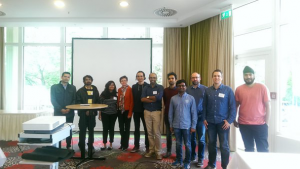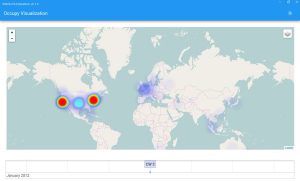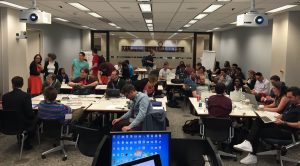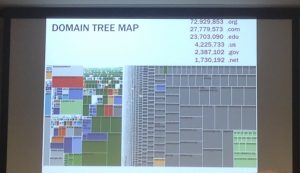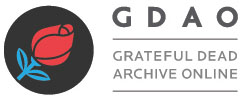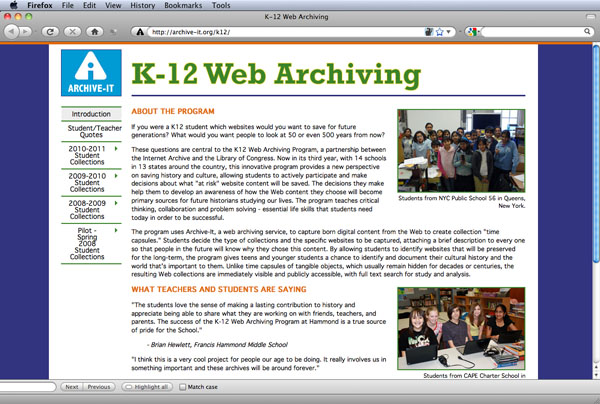A post by the Archive-It team
Today Phase 1 of the 5.0 release of the Archive-It web application was released for use by the 326 partners using the Archive-It service.
In 1996 when the Internet Archive was founded, we used automated crawlers to capture the web, snapping up millions of web pages and preserving them for history. Ironically, our digital record of humankind was being driven by computer algorithms.
As the years went by, it became clear that we needed people and communities to capture and save what is really and truly important. So in February 2006 we launched the Archive-It service, 1.0, which allowed traditional librarians and archivists to become web archivists by initiating focused, curated crawls of the live web using a simple web application with partner/tech support. Launching Archive-It meant we could help our colleagues create their own web collections for their own libraries and also foster a community around web archiving to work together to build a global digital public library at www.archive.org.
Now, as we expand to the next generation of Archive-It with our 5.0 release, we hope to provide even greater tools for collection development. Released this week, 5.0 phase 1 highlights a shiny new user interface and significantly enhanced post-crawl reports that include infographics with visual representations of the data.

Figure 1: Screenshot from the Reports section of the new Archive-It 5.0 user interface
Back in 2006 there was little understanding of web archiving and many organizations were questioning whether this was a valid activity that could or should be a part of their larger institutional collecting strategies. After all, the challenges were staggering: the quality of web content was all over the map; conflicting policies and organizational structures posed challenges; no one had yet established best practices for selecting the content, how to handle metadata, or how to integrate this new type of content into other holdings and existing catalogs at the institution. Also, back then we could not have predicted the extent to which material that once existed in physical form would now only appear on the web in digital form.
We launched the Archive-It service with a small band of believers and supporters, among them librarians and archivists from Indiana University, University of Texas at Austin, Library of Virginia, Montana State Library, and North Carolina State Archives and State Library. Partners were very patient with us and with Archive-It 1.0, which was bare bones. Collaborating and working with the library and archive community has always been a top priority for the Internet Archive, and a defining characteristic of the Archive-It service. There have been many times during the past 8+ years when we have not known the answer to a question and we say: “Let’s ask the community and see what they think!” And the community has always gotten back to us with supportive answers – both illustrative and specific.

Figure 2: Screenshot from the North Carolina State Government Web Site Archive of the North Carolina State Archives and State Library of North Carolina.
As time went on, the community of web archivists grew and we were able to produce some compelling answers to the question: why web archive? Here are just a few:
- To create a thematic or topical web archive
- To fulfill a mandate to preserve institutional memory and history
- To archive state or local agency publications no longer being deposited in print form
- To archive records to meet university or government retention policies
- To preserve an historical record of an institution’s web and /or social media presence
- To capture a website before re-design or it is taken offline
- To archive online art, exhibitions, and artists’ materials

Figure 3: Screenshot from the Latin American Government Documents Archive, LAGDA of the University of Texas at Austin.
 Figure 4: Screenshot from the Catalogues Raisonnés collection of the New York Art Resources Consortium (NYARC).
Figure 4: Screenshot from the Catalogues Raisonnés collection of the New York Art Resources Consortium (NYARC).
To date in 2014, 326 Archive-It partners have created 2700 public collections on a diversity and range of topics, subjects, events and domains. These collections have become integral to these organizations’ collecting strategies and have helped to raise awareness and understanding about why web archiving is so important.
We like to say that the Archive-It service is both a partner and a vendor. We are a service provider and we strive to consistently deliver a high level of customer support — which we believe partners notice and appreciate. We also strive to be a partner to our community and work collaboratively on initiatives that we share together; a few of which are: a) collaborative efforts around archiving spontaneous events (like the 2011 Japanese Earthquake collection), b) teaching web archiving in graduate level MLIS programs and professional development workshops and c) the K12 Web Archiving program (now in its 7th year) where we work with 3rd to 12 graders around the county and ask them what they would like to archive for future generations. As one of the student archivists put it, “500 years from now, kids will think we were really cool.”
Many of the features and functionality that we see in the Archive-It service today are a direct result of a partner making a suggestion or request. Through face to face brainstorming sessions, online surveys, webinars, and support tickets, partners have expressed their ideas as well as offered constructive criticism. And we have listened. We hope that as the service continues to grow and we launch Archive-It 5.0 that many of our partners will see themselves in Archive-It. Their collections will continue to be valuable to researchers, historians, scholars and the general public for many years to come.
Here are some links to just a few of those collections on the Archive-It website:
Columbia University’s collection on Human Rights: https://archive-it.org/collections/1068
National Museum of Women in the Arts’s collection on Contemporary Women Artists on the Web: https://archive-it.org/collections/2973
University of Alberta’s Circumpolar Collection: https://archive-it.org/collections/2475
Brigham Young University’s Mormon Missionary Collection: https://archive-it.org/collections/3609
Stanford University’s collection on Freedom of Information (FOIA): https://archive-it.org/collections/924
As we continue down this road – excited for the future and what comes next – we know that it takes a community to archive the web and we look forward to working with our partners to build libraries together.
 Help us build a web archive documenting reactions to the 2016 Presidential Election. You can submit websites and other online materials, and provide relevant descriptive information, via this simple submission form. We will archive and provide ongoing access to these materials as part of the Internet Archive Global Events collection.
Help us build a web archive documenting reactions to the 2016 Presidential Election. You can submit websites and other online materials, and provide relevant descriptive information, via this simple submission form. We will archive and provide ongoing access to these materials as part of the Internet Archive Global Events collection.